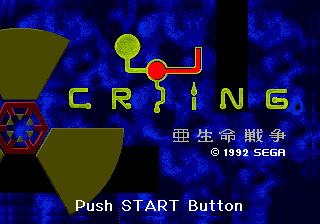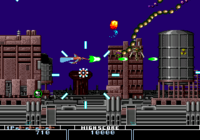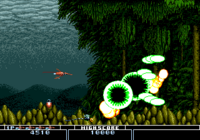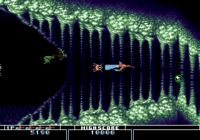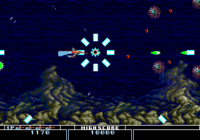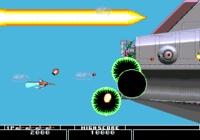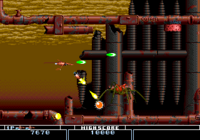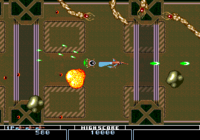Bio-Hazard Battle, known in Japan as Crying: Aseimei Sensou (クライング 亜生命戦争), is a Sega Mega Drive horizontal shoot-'em-up developed by Sega CS[1] and published by Sega. First released in Japan in October 1992, the game is most known for its unsettling organic designs and its offbeat soundtrack, and has developed a slight cult following for its unique tone.
Story
The planet Avaron (known as Avalon on the Japanese box, in a case of reverse Engrish) was plunged into deep biological war known as G-Biowar I, and a retrovirus was synthesized to try to defeat the enemy. Unfortunately, the plan backfires: the planet is rendered nearly inhospitable to humankind, and the only survivors of the virus are sent to space in the O.P. Odysseus to await a time when the new species of creatures that survive or thrive on the virus pose little enough a threat to set up a new colony.
That time eventually comes when computer probes show that conditions on Avaron are now hostile but livable, and thus the Odysseus deploys special craft that are both machine and living being, known as Bioships, to scout the areas of the planet labelled least hostile and find a new home for the survivors.
The game's stages display the virus outbreak, e.g. stage 2 is a ravaged city, stage 7 appears to be the facility where the virus was produced. According to the game's credits, ray tracing was used to create some graphics.
Gameplay
There are four Bioships available to pilot. Tap any button to fire normal shots, hold  for rapid-fire normal shots, and hold/release
for rapid-fire normal shots, and hold/release  or
or  to charge up and fire a Plasma Wall. Each Bioship has its own unique Plasma Wall. A miniature ship known as the Power Star circles around the Bioship that not only fires its own shots in time with the Bioship, but can also collect upgrades to its current weapon and can be used as a shield, absorbing enemy bullets before they can hit the Bioship. Touching the walls cannot harm the Bioship in this game.
to charge up and fire a Plasma Wall. Each Bioship has its own unique Plasma Wall. A miniature ship known as the Power Star circles around the Bioship that not only fires its own shots in time with the Bioship, but can also collect upgrades to its current weapon and can be used as a shield, absorbing enemy bullets before they can hit the Bioship. Touching the walls cannot harm the Bioship in this game.
Like many shoot-'em-ups, the game can be played solo or co-operatively. In a 2-player game, both players cannot select the same type of Bioship.
The game begins with an initial stock of 3, 4 or 5 lives as set in the options menu, and extra lives are given out based on score. Most stages also have extra lives in hidden spots, which are revealed by shooting at them. There are a total of 9 credits for the player(s) to continue the game with after all lives are lost.
Bioships
|
|
Orestes
|
Specifications:
- Bioship speed: Fast
- Yellow weapon: Fire Petal
- Orange weapon: Plasma Ring
- Blue weapon: Nova
|
|
|
Electra
|
Specifications:
- Bioship speed: Slow
- Yellow weapon: Fire Petal
- Orange weapon: Seeker Laser
- Blue weapon: Bond
|
|
|
Hecuba
|
Specifications:
- Bioship speed: Fast
- Yellow weapon: Spin Laser
- Orange weapon: Plasma Ring
- Blue weapon: Bond
|
|
|
Polyxena
|
Specifications:
- Bioship speed: Slow
- Yellow weapon: Spin Laser
- Orange weapon: Plasma Ring
- Blue weapon: Nova
|
Energy Seeds
There are a number of different normal shots, represented by differently-coloured power-ups referred to as Energy Seeds; strangely, normal shot types are partially shared between certain Bioships as listed above. Collecting multiple Seeds of the same colour will upgrade the currently-equipped weapon, up to a maximum of three Seeds.
|
|
Green
|
| Provides the Implosion Pods, the only weapon shared by every Bioship. A general purpose spreadshot and the default weapon of the Power Star.
|
|
|
Yellow
|
| Provides the Fire Petal which is a rapid-fire fireball cannon, or the Spin Laser which is a straight laser that can also destroy enemy bullets.
|
|
|
Orange
|
| Provides the Seeker Laser which is a homing laser, or the Plasma Ring which is a spinning energy ring that is reflected on contact with living matter.
|
|
|
Blue
|
| Provides the Nova which is a cross-shaped laser, or the Bond which fires slow homing orbs that can destroy enemy bullets and attach to enemies.
|
Stages
|
|
Reentry
|
| The game begins with the Odysseus deploying the Bioships selected for the mission, which will then descend through Avaron's stratosphere and the first waves of hostilities. All four colours of Energy Seed will be deployed by the Odysseus as soon as the planet's skyline is reached. The stage eventually ends on its own without a boss fight.
|
|
|
City Ruins
|
| Though the city has been abandoned since the deployment of the retrovirus, some of its defensive weapons are still operational and will ride along the city's highways, opening fire against the Bioships. The Bioships will eventually fly over the parts of the city that have been reduced to rubble and encounter the first boss of the game, whose weak point is its tail.
|
|
|
Forest
|
| The great forests and jungles of Asia have become alien and dangerous, and have become infested with giant dragonflies and flying centipedes. The boss is a giant worm that wriggles out of a decayed body whose weak point is the head, with a stream of butterflies coming from the hollow in the tree.
|
|
|
Bauxite Mine
|
| A long-abandoned mine consisting of narrow cavern passages filled with bat-like creatures, maggots and other hostilities. At a certain point in the stage, crystals will protrude from the ground and ceiling and must be shot at to proceed. The boss of this stage constantly protects itself using pieces of the ground and ceiling, which must be destroyed to expose its weak point.
|
|
|
Oceania
|
| The entirety of this stage is set underwater, and the Bioships are tasked with diving deeper than Odysseus' probes could to scout the ocean floor. All sorts of aquatic hostilities such as fish, jellyfish and underwater volcanoes make the ocean floor quite deadly. The boss is a giant anglerfish-like creature.
|
|
|
Flying Destroyer
|
| An automated warjet left over from G-Biowar I has been detected in Avaron's skies, and is programmed to seek out and destroy any colony humankind hopes to build on the planet. The Bioships have to take out the warjet's weapons and destroy the warjet piece-by-piece to make the skies safe.
|
|
|
Biowar Lab Grounds
|
| Scientists on the Odysseus need more information on the kinds of gene manipulation experiments that were going on when G-Biowar I started, and to do that, the Bioships need to be piloted through the Biowar Labs complex, which are teeming with mutant hostilities. This stage also ends on its own without a boss fight.
|
|
|
Biowar Lab Core
|
| The Bioships eventually reach the core of the Biowar Labs which hold the necessary materials for stabilising Avaron's biosphere. This stage has the Bioships move in different directions, so the player(s) will need to rely on the Power Star to shoot hostilities when flying backwards. The final boss is a spherical mech with multiple phases, including making stalactites rain from the ceiling.
|
Secret stage rumor
Various cheat sites claim there is a secret stage resembling an asteroid field. However, such a stage never existed.
Versions
Comparisons
- Main article: Bio-Hazard Battle/Comparisons.
Localised names
Also known as
| Language
|
Localised Name
|
English Translation
|
| English
|
Bio-Hazard Battle
|
Bio-Hazard Battle
|
| English (US)
|
Bio-Hazard Battle
|
Bio-Hazard Battle
|
| Japanese
|
クライング 亜生命戦争
|
Crying: Aseimei Sensou
|
| Korean
|
Crying (크라잉)
|
|
Production credits
- Scenario by: Hiroshi Mikatabara
- Programmed by: TONBE, Kazumi Nasu
- Sprite Designed by: Matsu G, Co Tani, Rauly.S.Kine, Senoko
- Scroll Designed by: Matsu G, Co Tani, Rauly.S.Kine
- Ray Tracing by: Matsu G
- Meta Ball Designed by: Senoko
- Sound Directed by: K.N.U.
- Schedule Management: marsh
- Package Designed by: Jordan, Naisho
- Package CG Designed by: Matsu G, Rauly.S.Kine
- Manual Edited by: Mongoose
- Package and Manual Directed by: LibidoCHAN, Janjakajan
- Special Thanks to: Lee, J.Yatsuchi, Wiwi Jumbo, Bo
- Also Thanks to: Shige D.O.R., Usagi, CegawaHD, Kamikawa, Eriko, Sunset, Kyamura, monkey, Fuzzy, SiFi TZK, Ikepon, Shinyuu, Sim Bancho, Devi and Pea, Atsu, Daichan, Menme
- Directed by: Kazumi Nasu
- Presented by: Sega Enterprises
Source: In-game credits
Digital manuals
Magazine articles
- Main article: Bio-Hazard Battle/Magazine articles.
Promotional material
Print advert in
Beep! MegaDrive (JP) #1992-11: "November 1992" (1992-10-08)
Physical scans
Mega Drive version
| {{{{{icon}}}|L}}
|
Division by zero.
|
Based on
0 review
|
| Mega Drive, JP
|
 Cover
|
 Cart  Manual |
| Mega Drive, US
|
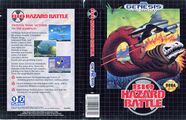 Cover
|
 Cart  PCB |
| Mega Drive, EU
|
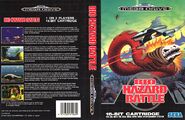 Cover
|
|
|
| Mega Drive, KR
|
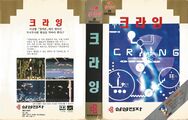 Cover
|
 Cart |
Mega Play version
| Mega Play,
|
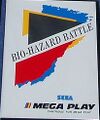 Cover
|
|
|
Technical information
ROM dump status
| System |
Hash |
Size |
Build Date |
Source |
Comments |
|
|
|
| ✔
|
| CRC32
|
95b0ea2b
|
| MD5
|
2d6764f7a96bb8b640a0d18102756ed2
|
| SHA-1
|
dca9d505302ce9ff1f98c4da95505139c7d3cafc
|
|
1MB
|
1992-09
|
Cartridge (US/EU)
|
|
|
|
|
| ✔
|
| CRC32
|
4aba1d6a
|
| MD5
|
c54dc959882622dc6e6cc92b03dd03b9
|
| SHA-1
|
c45b6da77021d57df6a9cb511cc93a5bf83ecf1c
|
|
1MB
|
1992-08
|
Cartridge (JP)
|
|
|
|
|
| ?
|
| CRC32
|
dd10dd1a
|
| MD5
|
e5d861fb4ce7560978b0d1aa5fbfb967
|
| SHA-1
|
1445b0babb52d252bf822d8d2eec0eda05b63229
|
|
1MB
|
1992-08
|
|
|
|
|
Page
|
| ?
|
| CRC32
|
4f19a73d
|
| MD5
|
9ce8a021d2e258e7631eddfff3538694
|
| SHA-1
|
66439a7a4b8cb3f195a5830b62ceb03c68392ac2
|
|
1MB
|
1991(?)
|
EPROM cartridge
|
|
|
|
Page
|
External links
References
- ↑ 1.0 1.1 https://sifi-tzk.hatenadiary.jp/entry/20050227/p2
- ↑ File:BHB MD JP Box.jpg
- ↑ 3.0 3.1 https://sega.jp/history/hard/megadrive/software.html (Wayback Machine: 2020-07-20 09:51)
- ↑ 4.0 4.1 4.2 GamePro, "December 1992" (US; 1992-xx-xx), page 52
- ↑ 5.0 5.1 5.2 5.3 Mean Machines Sega, "November 1992" (UK; 1992-10-xx), page 78
- ↑ https://www.nintendo.co.jp/wii/vc/software/02.html (Wayback Machine: 2018-03-05 23:11)
- ↑ http://vc.sega.jp:80/vc_crying/ (Wayback Machine: 2007-02-02 02:44)
- ↑ 8.0 8.1 http://www.nintendo.com/games/detail/nkGS_arHjNb5eHbK7jOddeYifSWTh-RO (Wayback Machine: 2010-11-22 23:49)
- ↑ 9.0 9.1 http://www.nintendolife.com/games/megadrive/bio_hazard_battle (Wayback Machine: 2017-07-05 04:24)
- ↑ https://www.nintendo.co.uk/Games/Virtual-Console-Wii-/Bio-Hazard-Battle--276335.html (archive.today)
- ↑ http://www.nintendo.com.au/index.php?action=catalogue&prodcat_id=41&prod_id=19726&pageID=4 (Wayback Machine: 2012-04-03 03:14)
- ↑ 12.0 12.1 12.2 12.3 12.4 https://steamdb.info/app/34316/ (Wayback Machine: 2016-07-30 03:41)
- ↑ 13.0 13.1 13.2 13.3 13.4 http://steamdb.info/app/34316/ (Wayback Machine: 2013-05-22 20:37)
- ↑ 14.0 14.1 14.2 14.3 14.4 14.5 14.6 14.7 14.8 14.9 https://steamdb.info/app/34316/history/?changeid=5755290
- ↑ 15.0 15.1 15.2 15.3 15.4 15.5 15.6 15.7 15.8 15.9 http://steamdb.info/app/34316/ (Wayback Machine: 2019-09-06 18:40)
- ↑ 1700 igr dlya Sega, "" (RU; 2001-xx-xx), page 32
- ↑ Aktueller Software Markt, "Februar 1993" (DE; 1993-01-11), page 136
- ↑ Beep! MegaDrive, "November 1992" (JP; 1992-10-08), page 28
- ↑ Consoles +, "Janvier 1993" (FR; 199x-xx-xx), page 84
- ↑ Cool Gamer, "9" (RU; 2002-10-13), page 35
- ↑ Electronic Gaming Monthly, "December 1992" (US; 1992-xx-xx), page 34
- ↑ Entsiklopediya luchshikh igr Sega. Vypusk 1, "" (RU; 1999-xx-xx), page 295
- ↑ Mean Machines: The Essential Sega Guide, "" (UK; 1993-11-18), page 26
- ↑ GameFan, "Volume 1, Issue 1: October 1992" (US; 1992-xx-xx), page 6
- ↑ Gamers, "Dezember/Januar 1993" (DE; 1992-11-19), page 80
- ↑ Hippon Super, "December 1992" (JP; 1992-11-04), page 82
- ↑ Joypad, "Décembre 1992" (FR; 1992-1x-xx), page 104
- ↑ Joystick, "Décembre 1992" (FR; 1992-1x-xx), page 193
- ↑ Sega Mega Drive Advanced Gaming, "February 1993" (UK; 199x-xx-xx), page 40
- ↑ Mega, "December 1992" (UK; 1992-11-19), page 40
- ↑ Mega Fun, "11/92" (DE; 1992-10-xx), page 36
- ↑ MegaTech, "November 1992" (UK; 1992-10-20), page 26
- ↑ Marukatsu Mega Drive, "November 1992" (JP; 1992-10-xx), page 108
- ↑ Player One, "Décembre 1992" (FR; 1992-12-10), page 60
- ↑ Play Time, "3/93" (DE; 1993-02-10), page 111
- ↑ Power Play, "2/93" (DE; 1993-01-xx), page 140
- ↑ Sega Power, "January 1993" (UK; 1992-12-03), page 35
- ↑ Sega Force, "December 1992" (UK; 1992-11-05), page 80
- ↑ Sega Mega Drive Review, "1" (RU; 1995-04-03), page 37
- ↑ Sega Saturn Magazine, "September 1995" (JP; 1995-08-08), page 85
- ↑ Tricks 16 bit, "Tricks Sega Gold 800 igr" (RU; 1998-03-20), page 8
- ↑ Video Games, "2/93" (DE; 1993-01-27), page 93
![]() for rapid-fire normal shots, and hold/release
for rapid-fire normal shots, and hold/release ![]() or
or ![]() to charge up and fire a Plasma Wall. Each Bioship has its own unique Plasma Wall. A miniature ship known as the Power Star circles around the Bioship that not only fires its own shots in time with the Bioship, but can also collect upgrades to its current weapon and can be used as a shield, absorbing enemy bullets before they can hit the Bioship. Touching the walls cannot harm the Bioship in this game.
to charge up and fire a Plasma Wall. Each Bioship has its own unique Plasma Wall. A miniature ship known as the Power Star circles around the Bioship that not only fires its own shots in time with the Bioship, but can also collect upgrades to its current weapon and can be used as a shield, absorbing enemy bullets before they can hit the Bioship. Touching the walls cannot harm the Bioship in this game.

